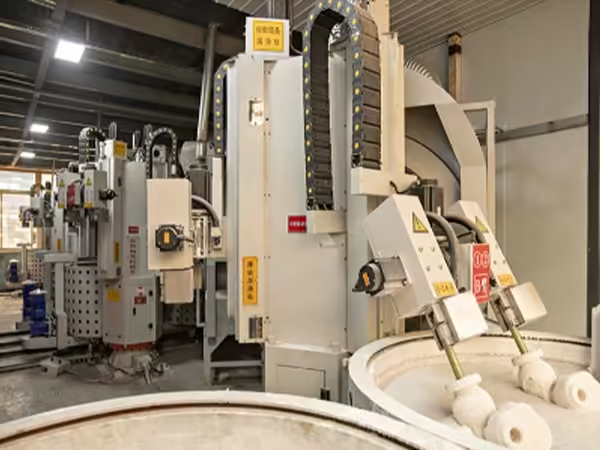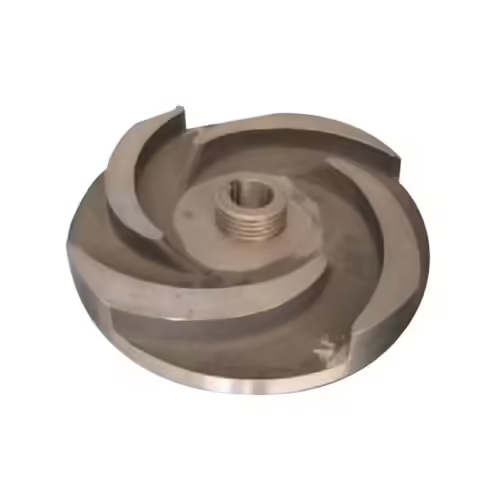Wie erkennt man ein minderwertiges, gut gegossenes Laufrad aus China?
Willkommen auf meinem Blog!
Ich freue mich sehr, dass du hier bist! Bevor wir uns in die Inhalte vertiefen, würde ich mich freuen, wenn du mir auf meinen Social-Media-Plattformen folgst. Dort teile ich zusätzliche Einblicke, vernetze mich mit unserer großartigen Community und halte dich über die neuesten Nachrichten auf dem Laufenden. So bleibst du in Verbindung:
📘 Facebook: Shanghai Leierwo Industriehandel Co., Ltd.
Lassen Sie uns gemeinsam auf diese Reise gehen! Ich hoffe, Sie finden die Inhalte hier nicht nur aufschlussreich, sondern auch inspirierend und wertvoll. Los geht‘s!
Inhaltsverzeichnis
Einführung

The quality of a China Gut gegossenes Laufrad is crucial for the overall performance and longevity of any pumping system. A truly well-crafted China Well Casted Impeller ensures efficient fluid flow, minimizes wear and tear, and significantly contributes to energy savings. However, not all China Well Casted Impellers are created equal. Poorly made options can result in system failures, reduced efficiency, and costly maintenance.
In this article, we’ll guide you through five essential tips to help you spot a low-quality China Well Casted Impeller and make better purchasing decisions. We’ll also provide a detailed guide on choosing a high-quality impeller and identifying the critical aspects to examine during inspections.
Shanghai Leierwo Industry & Trade Co., Ltd. specializes in the production of premium China Well Casted Impellers, utilizing advanced investment casting and silica sol technology. With years of industry experience and a wide selection of alloy grades, Leierwo ensures each China Well Casted Impeller is precision-engineered to meet demanding application needs. Now, let’s explore how to identify a substandard China Well Casted Impeller and avoid performance issues before they arise.
Tip 1: Examine the Material Quality of the China Gut gegossenes Laufrad
Material quality plays a fundamental role in the performance, reliability, and longevity of any impeller. A well-casted impeller must withstand high levels of stress, pressure, and fluid velocity during operation. Therefore, the foundation of any premium impeller is the quality and consistency of the alloy used in its construction.
Common Material Defects:
- Inconsistent Composition: Impellers manufactured with low-grade or improperly mixed alloys can exhibit unpredictable mechanical behavior, including early fatigue failure.
- Low Strength and Corrosion Resistance: A substandard impeller made from inferior materials is far more susceptible to corrosion, erosion, and mechanical degradation in demanding environments.
- Inadequate Heat Treatment: Proper heat treatment processes (like quenching and tempering) enhance the hardness and toughness of the alloy. Improper treatment may result in brittle zones, internal stresses, and micro-cracks.
What to Do:
- Request Material Certificates: Ask for mill test reports (MTRs) or certificates of analysis (COA) that validate the chemical composition and mechanical properties of the alloy.
- Select Trusted Suppliers: Work with suppliers like Leierwo, which offers a range of high-grade stainless steel, alloy steel, and carbon steel materials tailored to your application requirements.
- Specify Application-Based Alloys: Choose materials based on the operating environment—e.g., select stainless steel for corrosive environments or high-strength alloy steel for high-pressure applications.
Tip 2: Inspect for Surface Imperfections

A visual and tactile inspection of the impeller surface can quickly reveal flaws that might compromise performance. Even seemingly minor imperfections can lead to turbulence, cavitation, or mechanical imbalance.
Common Surface Defects:
- Porosity: These small voids form due to trapped gas or shrinkage during cooling. They compromise mechanical strength and can lead to rapid degradation under cyclical stress.
- Cracks: Surface cracks, whether from thermal shock or casting errors, are critical red flags and often indicate the presence of internal stress or casting shrinkage.
- Rough Surfaces: Excessive surface roughness increases drag and fluid turbulence, reducing the efficiency of the pump or turbine.
What to Do:
- Conduct Visual and Tactile Inspections: Use magnification tools and surface roughness testers if available.
- Reject Any Impeller with Visible Flaws: Even small imperfections can magnify over time under operational conditions.
- Ask for Finished Samples or Surface Finish Specifications: The surface finish should meet industry standards—typically within Ra 3.2 µm or smoother, depending on the application.
Tip 3: Verify Dimensional Accuracy with Inspection Tools
Dimensional precision is essential for smooth assembly and optimal operation. Even the slightest deviation from design specifications can disrupt fluid dynamics or cause premature wear of mating components.
Common Dimensional Issues:
- Incorrect Blade Angles: Blade geometry directly affects the velocity and direction of fluid flow. Misangled blades reduce pump efficiency and cause turbulent flow.
- Improper Shaft Hole Alignment: Misalignment can lead to shaft wobble, bearing damage, and seal leakage.
- Uneven Blade Thickness: Imbalanced impellers cause vibration, noise, and rapid mechanical wear.
What to Do:
- Use Advanced Measuring Equipment: Employ Koordinatenmessgeräte (KMGs), optical comparators, oder laser scanners to check critical dimensions.
- Cross-Check with CAD Drawings: Ensure the impeller matches 2D/3D design specifications to the micron level.
- Verify Tolerances: Make sure the manufacturer adheres to industry tolerance standards (e.g., ISO 2768 for general tolerances).
Tip 4: Check for Poor Quality Casting Techniques
Casting is a complex process that requires precision and expertise. Low-quality China well casted impellers often result from improper casting techniques. Issues such as incomplete filling, poor gating and riser design, and improper mold preparation can result in defective impellers.
Common Casting Issues:
- Incomplete Filling: If the mold is not filled properly, the impeller may have hollow spots or weak points, leading to failures during operation.
- Poor Gating and Riser Design: Incorrect gating and riser design can lead to misdistribution of molten material, causing defects in the final casting.
- Improper Cooling Rates: Rapid or uneven cooling can result in warping or internal stresses, compromising the impeller’s durability.
What to Do:
- Choose Modern Casting Techniques: Insist on technologies like Feinguss oder silica sol precision casting, which provide superior accuracy and minimal post-processing.
- Evaluate the Mold Design Process: High-end manufacturers use CAD/CAM and simulation software to test mold designs before production.
- Request Casting Process Documentation: Ask your supplier to explain their process flow, from mold preparation to final trimming and inspection.
Companies like Leierwo are known for using advanced, standardized casting protocols to deliver consistent and defect-free components.
Tip 5: Evaluate the Manufacturer’s Quality Control Processes

A reliable manufacturer will have stringent quality control processes in place to ensure every impeller meets the required standards. Low-quality impellers often result from inadequate inspection and testing procedures.
Quality Control Measures to Look for:
- Zerstörungsfreie Prüfung (NDT): Techniques such as X-ray inspection and ultrasonic testing should be used to detect internal defects without damaging the part.
- Dimensional Inspection: The use of coordinate measuring machines (CMM) and other precision tools ensures that the impeller’s dimensions meet specifications.
- Regular Audits and Inspections: Consistent audits and inspections are crucial to maintaining quality across batches.
What to Do:
- Ask for Quality Certificates: Look for ISO 9001 certification or equivalents, which indicate structured quality systems.
- Request NDT Reports: For critical applications, insist on NDT reports as proof of internal soundness.
- Visit the Facility (if possible): An on-site audit can reveal much about how seriously the manufacturer takes quality assurance.
China Well Casted Impeller Quality Control Table
| Quality Indicator | High-Quality Impeller | Low-Quality Impeller |
|---|---|---|
| Material Consistency | Uniform alloy grade | Inconsistent composition |
| Oberflächenbeschaffenheit | Smooth, defect-free | Porosity, rough spots |
| Dimensional Accuracy | Precise and aligned | Variations in dimensions |
| Casting Process | Advanced techniques | Poor gating and riser design |
| Inspection Methods | NDT, CMM, regular audits | Limited or no testing |
Abschluss
Identifying a low-quality China well casted impeller is essential to maintaining the efficiency and longevity of your pump systems. By following these five simple steps—examining material quality, inspecting surface imperfections, verifying dimensional accuracy, checking casting techniques, and evaluating the manufacturer’s quality control processes—you can avoid costly mistakes and ensure the best performance from your impellers.
Shanghai Leierwo Industry & Trade Co, Ltd. is committed to providing top-notch precision castings, including China well casted impellers, using the latest technology and rigorous quality control. With our expertise in alloy grades and custom solutions, we are ready to meet your demanding applications and provide reliable casting products for pumps and other industries.
Häufig gestellte Fragen
What is the ideal material for a China well casted impeller?
The ideal material depends on your application. Common materials include stainless steel, carbon steel, and alloy steel, which offer various benefits in terms of strength, corrosion resistance, and thermal conductivity.
How can I ensure that my impeller is of high quality?
Ensure the manufacturer uses advanced casting techniques, offers thorough inspection methods such as NDT and CMM, and has a proven track record of delivering quality products.
What are the common issues with low-quality China well casted impellers?
Common issues include dimensional inaccuracies, surface defects like cracks or porosity, and improper material composition, which can lead to performance failures.
Can Leierwo help with customized impeller designs?
Yes, Leierwo specializes in providing custom casting solutions, including tailored impeller designs to meet your specific needs, using advanced investment casting and CNC machining.
Produktkategorien
- Ventilteile
- Wasserpumpenteile
- Lagergehäuseteile
- Druckgussteile
- Pumpenprodukte aus Edelstahl
- Pumpenprodukte aus Gusseisen
- Ventilteile für den Automobilgebrauch
- Autoteile
- Ventilteile für den zivilen Gebrauch
- Vakuumpumpenteile KF

